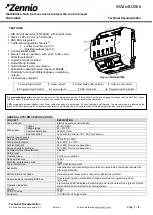
Size
A
B
C
D
E (Dia.)
F
in
Pipe Size (in)
Min. Length (in)
in
in
in
in
1
1/4
1
3.12
0.38
0.25
0.44
0.55
1
1/2
1
3.12
0.38
0.25
0.44
0.50
2
1
1/4
3.38
0.38
0.25
0.44
0.50
2
1/2
2
4.0
0.38
0.38
0.56
0.62
3
2
1/2
4.5
0.50
0.38
0.56
0.62
4
3
5.0
0.50
0.44
0.56
0.62
6
5
6.50
0.62
0.44
0.56
0.62
6. After removing the Stem Nut, the remainder of the Disc & Diaphragm Assembly should disassemble easily. Polish stem guide
surfaces with fine emery cloth to remove any mineral deposits and inspect for excessive wear. Remove any mineral build-up from
other components with wire brush or by using a Mineral Dissolving Solution. Inspect parts for wear and replace if necessary.
7. Inspect valve seat. If seat is not damaged, removal is not necessary. Valve seats 6" and smaller are threaded into the body of the
valve and require a seat removal tool (Figure 5) (Table 1 details the tool dimensions for seat removal). Valve seats 8" and larger are
held in the valve body with stainless steel cap screws. Remove seat retaining screws and lift seat straight up (Figure 6).
Figure 6
*Schedule 40 steel pipe
Figure 5
Valve Body
Valve Seat
All-Thread
Nut and Washer
2PLCS
Angle or
Channel Iron
120
B (Min)
E Dia. 4 Holes
90 Apart
D
TYP <3 PLCS>
120 Apart
C TYP <3 PLCS>
F
A
Table 1: Seat Removal Tool Dimension
IOM-ACV-115-74_6115-74 2115
EDP# 1917043
© 2021 Watts 9





























